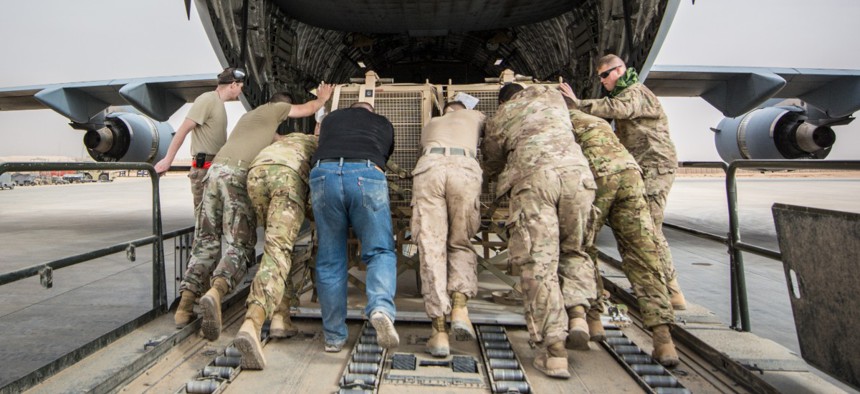
Soldiers, Marines, Airmen and civilian contractors push equipment into the cargo bay of a C-17 Globemaster III, assigned to the 816th Expeditionary Airlift Squadron, at Al Asad Air Base, Iraq Jan. 25, 2018. Staff Sgt. Patrick Evenson/Air National Guard file photo
Analysis: America’s Wars Wouldn’t Be Possible Without Contractors
But presidents usually ignore the thousands who have died.
Mike Jabbar never met his replacement. But when Nawres Hamid died in a rocket attack on a military base in Iraq after Christmas, Jabbar saw photos of the wreckage and recognized the American flag he himself had helped paint on the door of a room now mangled. That was his old room, on his old base. It could have been him.
“Imagine something like that happens, knowing that you were supposed to be there and you weren’t there, and the person that replaced you is gone,” Jabbar, who like Hamid served as a translator for the U.S. military, told me in an interview. “It absolutely feels horrible.”
Jabbar was one of the lucky ones. He left his home country of Iraq last fall, at age 23, for the United States, where he’s now a permanent resident living with a friend in North Carolina.
The U.S. has relied on thousands of contractors like him and Hamid to help conduct its wars, in roles handling translation, logistics, security, and even laundry. America cannot go to war without its contractors, but presidents usually ignore the thousands who have died, including U.S. citizens. They are ubiquitous but largely unseen by the American public, obscuring the real size, and the real cost, of America’s wars. This also means that a president can selectively seize on one contractor’s death in the service of other goals.
Senior U.S. officials invoked Hamid, an Iraqi-born U.S. citizen, repeatedly to explain why they brought America to the brink of an all-out conflict with Iran—days before the public knew his name. Donald Trump, who has vowed to end wars in the Middle East, was willing to risk a new one to avenge an American contractor’s death—including by killing the Iranian general Qassem Soleimani, a step previous presidents worried could unleash a violent backlash. Yet when a terrorist attack killed two more American contractors and one U.S. soldier in Kenya about a week later, Trump barely reacted. “We lost a good person, just a great person,” he said of the soldier. He didn’t mention the contractors.
As America's interventions abroad have become more complex and open-ended, the country has relied on contractors more and more for essential jobs like guarding diplomats and feeding the troops. Even as the U.S. tries to end those wars and bring more troops home, contractors can stay behind in large numbers to manage the aftermath—especially since many of them are local hires in the first place.
The government has no data on exactly how many American contractors have died in the post-9/11 wars; in fact, it’s hard to get a full picture of how many contractors have been involved in those wars at all. The Defense Department publishes quarterly reports on how many it employs in the Middle East—close to 50,000 in the region as of last October, with about 30,000 spread through Afghanistan, Iraq, and Syria. Americans make up less than half the total, in a region where U.S. troop numbers fluctuate between 60,000 and 80,000. The contractor numbers fluctuate too, and the military’s data don’t include contractors working for other agencies, such as the CIA or the State Department.
The death toll is murkier still, though Brown University’s Costs of War Project gives a figure close to 8,000, counting Americans and non-Americans. “They are,” in the words of Ori Swed and Thomas Crosbie, researchers who have studied contractor deaths, “the corporate war dead.”
Jabbar told me he was happy to take on that risk. Like Hamid, he was born in Iraq; from his middle-school years, he said, he wanted to become an American, and taught himself English in part by listening to Eminem and watching Prison Break. He dropped out of college at 19 to serve as a translator in the U.S. fight against the Islamic State, and wound up alongside U.S. troops as they pushed toward the group’s Iraqi capital of Mosul in 2016. Instead of studying English and earning an information-technology degree, he was in the middle of a fight to wrest back territory from insurgents, translating battlefield instructions for the Americans’ Iraqi partners.
He later ended up with a Navy SEAL unit in Kirkuk, near where he grew up, and became all but officially part of the team; he lived with them, ate with them, patrolled with them, went to the front lines with them. Jabbar even once got beaten up and arrested while getting groceries for them—a case, he said, of mistaken identity, resolved only after he’d spent the night in jail.
“It is hard for me [to] emphasize enough how critical these dedicated people were to our military mission,” Joseph Votel, the former commander of U.S. forces in the Middle East, who retired last March after three years helping direct the anti-ISIS fight, wrote to me in an email. Interpreters on contract with the U.S. military were more than just language translators. “They helped with our understanding; they provided cultural context to the events playing out on the ground; and, they came to us with networks of their own that [were] always very useful in navigating complex situations … They did all this at their own personal risk.”
America’s reliance on private contractors in war didn’t start with 9/11, but it exploded in the wars that followed those attacks. The political imperative to keep troop numbers limited, and the need to rebuild amid conflict, meant that contractors filled gaps where there weren’t enough troops or the right skills in the military to do the job. They could often work more cheaply than U.S. troops. They might get limited compensation for death or injury, compared with a lifetime of Veterans Affairs benefits; they could deploy to places where the U.S. didn’t want to or couldn’t legally send the military, Steven Schooner, a professor of government procurement law at George Washington University, told me.
Even before the 2003 U.S. invasion of Iraq, Leslie Wayne documented the rise of contractors in The New York Times, noting their roles in training U.S. troops in Kuwait and guarding Hamid Karzai, then Afghanistan’s president. “The Pentagon cannot go to war without them,” she wrote. “During the Persian Gulf war in 1991, one of every 50 people on the battlefield was an American civilian under contract; by the time of the peacekeeping effort in Bosnia in 1996, the figure was one in 10.” In Afghanistan, according to the latest U.S. military figures from last fall, the ratio of American contractors to U.S. troops is almost 1 to 1; including local and third-country contractors, it’s about 2 to 1.
Iraq contributed further to the trend. “At the beginning of the Iraq War, expectations, foolish as they may have been in retrospect, were that this would be a pretty easy thing,” Deborah Avant, a professor at the University of Denver who has researched the industry, told me. But as the situation deteriorated, it would have been difficult to mobilize tens of thousands of additional troops to provide security. So contractors filled the gap—and not just for the Defense Department. “If ABC News was there, they needed to have security,” Avant said.
They weren’t just providing security, though, and they weren’t just American. They came from a range of countries in addition to the U.S. and did a range of jobs that in prior years the military had handled. “When I went into the Army … everybody was trained as a soldier, and then after you were qualified as a soldier, you might have trained to be a cook, or a laundry specialist, or a postal specialist, or a transportation specialist,” Schooner said. “Today, we train trigger-pullers, and we’ve outsourced all support services.” Because many U.S. missions overseas now involve reconstruction, contractors can also provide thousands of local jobs in struggling economies.
With contractor support, Schooner said, “We can send innumerable troops anywhere in the world, any distance, any weather, any geography, and we have them taken care of better than any army has ever cared for its people, for as long as you need.”
But the biggest benefit of all may be political. “Americans really don’t care what war costs,” Schooner said. “All they really care about is win or lose, and how many of our boys and girls come home in bags and boxes. So if you can, intentionally or unintentionally, directly or indirectly, artificially deflate the number of body bags or boxes, you’re winning.”
This doesn’t always work, however—and Iraq in particular has shown how contractor deaths or missteps can have severe political consequences, or even escalate conflict. Contractors have committed crimes that have hurt U.S. prestige and destroyed lives in Iraq—including the torture of inmates at Abu Ghraib prison in 2003, and the 2007 massacre of 17 civilians in Baghdad’s Nisour Square. In 2004, four armed contractors were ambushed in Fallujah, their burned and mutilated bodies hung from a bridge. An “angry and emotional” President George W. Bush then directed the Marines to seize the city, the historian Bing West told a BBC reporter. The result was a vicious urban battle that left 27 American troops dead, along with roughly 200 insurgents and 600 civilians.
In Hamid’s case, Jabbar thinks Trump got some justice in having Soleimani killed. “[Hamid’s] gone now,” Jabbar said, “but if he knows somehow that all this happened because of him, he would be so happy. And I’m so glad that at this point interpreters are being looked at as very valuable.” Jabbar himself left Kirkuk as soon as he could, because he said he was facing threats. He received a rare visa to come to the U.S. through a program for interpreters that the Trump administration had slashed. He believes that the visa saved his life, and he wants to serve again—this time in the Air Force.
As for Soleimani, Jabbar is glad he’s dead. “He’s the guy who orders others to go and kill ‘traitors’ and interpreters.”







